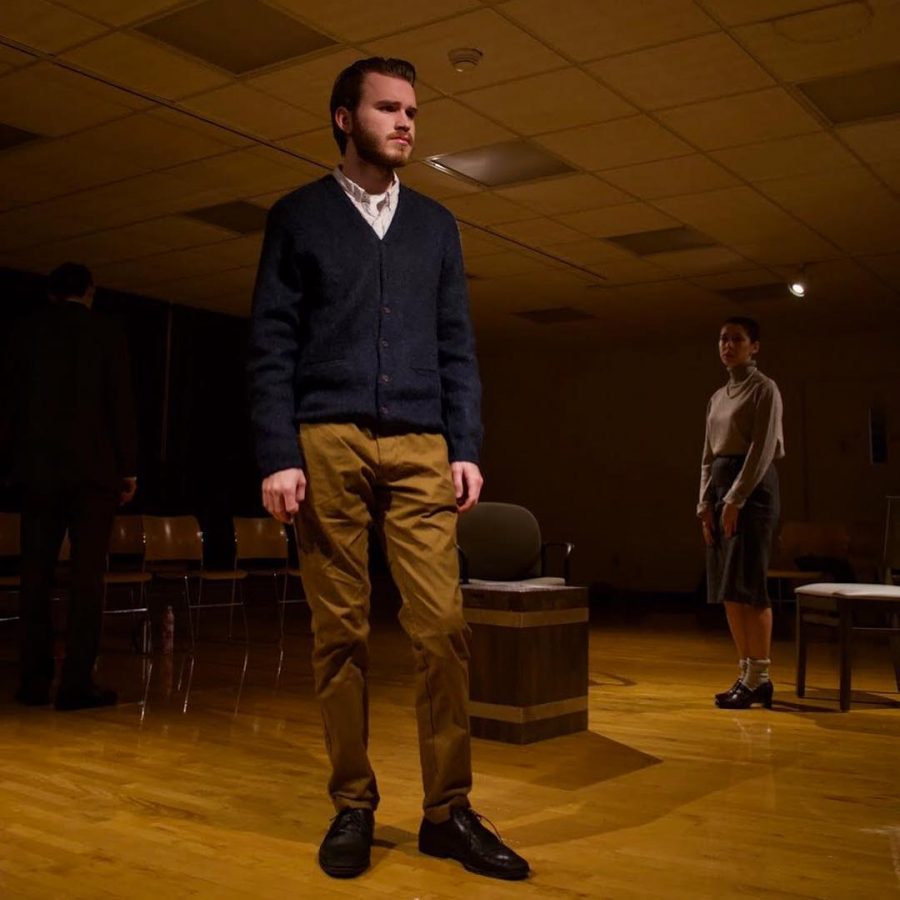Science Gets a Theatrical Spin with “Copenhagen”
College junior Hartley Wise stars in Copenhagen, an Oberlin College Theater production with performances tonight and Saturday.
Copenhagen, a play by Michael Frayn that explores a mystery of modern history, debuted yesterday in South Studios, and will run through Saturday, Dec. 1.
In the play, the spirits of Werner Heisenberg, Niels Bohr, and Niels’ wife Margrethe discuss why Heisenberg went to Copenhagen to meet Bohr during the height of WWII. Heisenberg, the lead physicist for the Nazi nuclear project, risked his life to visit his friend and mentor Bohrs, a Jewish physicist with ties to the Allied powers. In the afterlife, the two scientists share conflicting accounts of their disastrous meeting and their discussion about the undeveloped atomic bomb.
The play addresses the uncertainty of people’s memories and motives as the characters wrestle with the question: Why do we do the things we do?
College sophomore Lex Martin, who plays Heisenberg, reflected on the questions that Copenhagen raises about the nature of memory in an email to the Review.
“Everything about this play deserves second glances,” Martin wrote. “On the surface, it is about a historically factual conversation between two figures that [were] slowly figuring out that they had the fate of the world in their hands. … With another listen, though, it becomes [uncertain] whether their appreciation of nuclear potential was fully formed at the time. How do people recall the past? What do we wish to believe about ourselves? … Everybody can burrow into their beliefs and play back the past as they’d like to remember it. But how well were we watching ourselves? … Deep, deep down, these same themes echo among the most evidenced [tendencies] of the universe. Coincidence? I think not.”
The play incorporates scientific language and concepts in a way that is approachable for people unfamiliar with STEM. College senior Jackson Zinn-Rowthorn, director of the production, addressed this in an email to the Review.
“[The play] takes these arcane physics concepts of uncertainty and complementarity and employs them as metaphors for the personal struggles of the two physicists who first worked them out,” he wrote. “And in doing so they become accessible and relevant to people like me who aren’t necessarily science-minded.”
Zinn-Rowthorn described how the production’s minimal set affected the rehearsal process.
“Whereas other shows I’ve directed were much more tech-heavy and involved a lot of moving parts, this one calls for three actors and three chairs and very little else,” he wrote. “So the rehearsal process was streamlined, and we were afforded a lot of time to focus on text analysis and close scene work. … It’s an intensely demanding show for actors because, without tech, the brunt of the storytelling work falls on their shoulders. I’m so fortunate to be collaborating with three excellent actors. … Their dedication and talent consistently blows my mind.”
College junior Amanda Stavis, who plays Margrethe, echoed this sentiment.
“It’s a physically stripped-down show with a small cast, so we could really do a deep dive on the acting work,” Stavis wrote in an email to the Review.
These circumstances also afforded the cast the space to consider the central themes of the play. In her email, Stavis said that she thinks the play imparts the message that “no one person or event is easily morally definable.”










